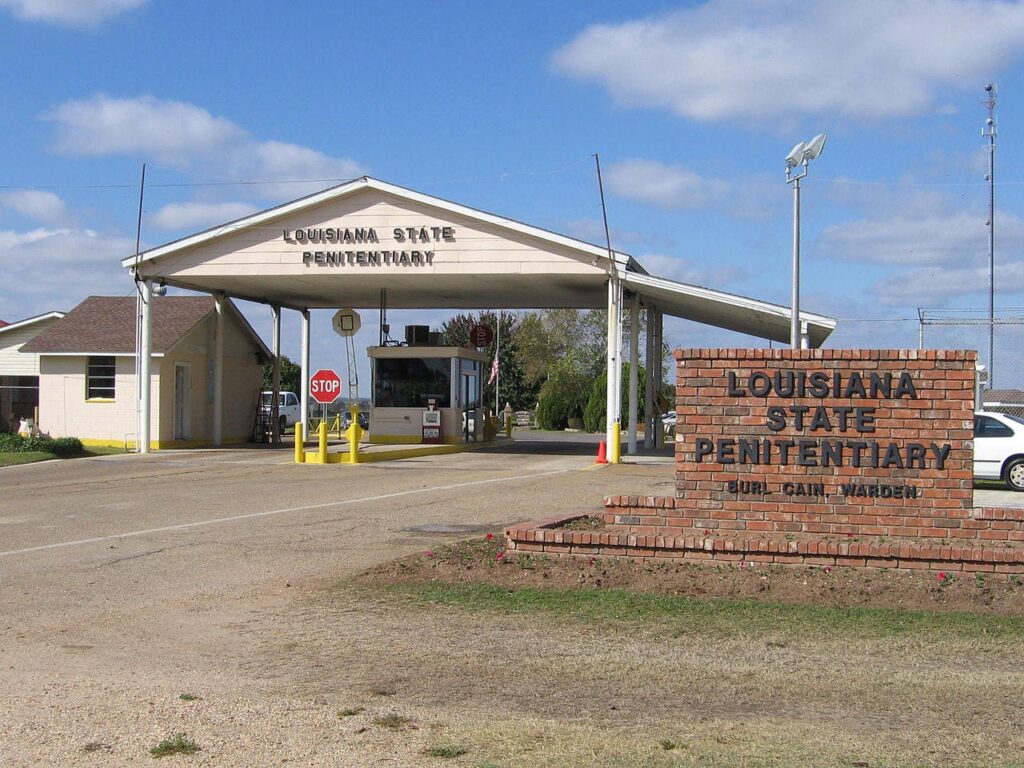When I set foot down in Angola (Louisiana State Penitentiary) in 1975, I had no clue what to expect, was scared out of my mind and never expected – by any means – to ever leave. My arrival was heralded by a pot-bellied, snuff-dipping, foul-mouthed redneck guard who told me to get my “fuckin’ sorry ass in that ditch and get to cuttin’ or I’m gonna’ show ya’ a new place for ya’ to sleep!”
So…THIS is Angola?
I found myself at 7:15 a.m. on my very first full day in Angola wading into greenish murky water that came up almost to my waist. My clothes were the same ones I had on at the time of my arrest a year earlier – bell-bottom Levi’s, a Polo shirt and Converse shoes. They were stylish when I last had them on; here, now, I felt like they were flashing a neon sign that said, “Scared as Hell!” Looking around me there were 19 other guys in various types and colors of clothing and every one of them had a different sign flashing: “Scared as You!”, “Defiant!”, “I’m Mad!”, or “I’m Lost!”.
The only one who didn’t have a sign flashing around him was the foul, pot-bellied guard sitting on the horse prancing around above us on the bank. He didn’t need a sign because every time the hack spurred the beast he would throw clods of mud into the water splashing on us, the guard cursing the horse and us simultaneously. It was not a pretty sight, and unsettling to say the least, especially on an empty stomach. How in the hell did I end up here, waist-deep in slimy green water, beating on a cypress tree with a dull ditchbank blade and a redneck hack screaming at me? I had only been here for about 9 hours!

The next 47 years would fly by or crawl by or stand stock-still; there would be good times and better times, and there would be bad times and horrible times and some absolutely bone-crushing frightening times. There would be times when I doubted the likelihood of waking the next day, or even of making the next meal. There would be times when I hated every single free man (employees of DOC) that I came into contact with, and I knew that they hated me. And believe it or not, there was actually a time when my heart ached when I stumbled upon a Captain trying to hide so he could cry because his phone rang and he found that his wife had just miscarried their second expected baby.
Prisons bring out the widest array of emotions that it is possible for any one human to display, and the timing of their surge to the surface is never quite optimal. At the most inopportune time one could be overwhelmed with a crushing sense of sadness that took all the breath out of you, or filled with a rage that blinded you with a fury burning so bright that you radiated with the anger and those around you felt the warmth.
So, we were prisoners not only of the rules and bars and fences and concrete, but of our own emotions as well. In effect, we became our own jailers bound by our angers and sadness and fears. This was our world.
I used to laugh – inwardly, of course, as outright mockery could earn you a quick and nasty ass-whipping – at the brazen stupidity of some of our keepers. Take the Compound Shakedown Lieutenant who found a 3.5” floppy disk (remember those ancient artifacts?) in my shirt pocket and when I explained that it contained “files” wanted to lock me up for an Attempted Escape.
Or the one who wrote me up for having a tiny flower plant in a clay pot. I used to take the pot outside early in the morning and let it get sun and air, and return it in the evening. Watching it steadily grow and begin to bloom and fold its petals at night as if sleeping gave me a sort of calming pleasure. The guard who wrote me up for it did so out of a sense of petty vengeance – he could do it, and there was nothing I could do about it. I get my pleasure now knowing that I can tell others about how petty he is, and there’s nothing he can do about it.

I suffer from COPD so a macing or tear gassing incident can deal me a lot of trauma. In all my years of incarceration, I was only personally gassed twice, but fell victim as a “collateral bystander” on several occasions. There is nothing more frightening than not being able to breathe. The unbearable weight of tons of stone pressing down upon your chest, the heart-rending agony of even a breath of the poison sending coughing spasms down into your lungs, wracking your entire body, tears streaming down your cheeks and making the burning in your eyes worse…
Both times that it was directed towards me personally were done by the same guard, and he did it because he could and because he didn’t like me and because I showed him just how stupid he was. So, yeah….my bad. I really should have left him in the dark. Would have saved me a lot of pain and suffering. But, he would still have been stupid.
One of the things I learned fairly early on was to pick my battles, and to pick ones that I thought I could win. The end goal, of course, was to win the war, but to do it one battle at a time. Just surviving was winning. The bastards wanted me to die there – I wanted to live. Just this morning I realized that I had in fact won the war, because I’m out here in Florida with a swimming pool not far from my front door, and he’s still right there in Angola.
By the time I was released, I had grown considerably older, a lot wiser, and much more tolerant of my fellow human beings. And, therein lies the rub – I now saw them as human beings instead of just blue-suit guards with hangovers and erectile dysfunction bent on making my life as miserable as they perceived theirs to be. But, this wasn’t a sudden thing that came about at the end of a long sentence. This was a gradual change that occurred over a long period of time, over a lot of emotional roller-coasters, and over a lot of personal triumphs and personal losses.
I can easily say now that by the time I walked out that Front Gate into the free world I could count among my friends at least 3 Deputy or Assistant Wardens, a Colonel, several Majors, a few Captains, a couple of Lieutenants, and a dozen or so Sergeants. Now, that doesn’t mean at all that I fell soft or forgot who I was and started mingling with the enemy. It just means that I now viewed them for what they were and they finally saw me for who I am – human beings.
And, I’m glad for that because it finally allowed me to win that final battle, which let me win the war: I saw myself as a human being. I was no longer an angry drug-addicted Vietnam veteran and a survivor of abuse. I’m human, and it’s so nice to be here with you.